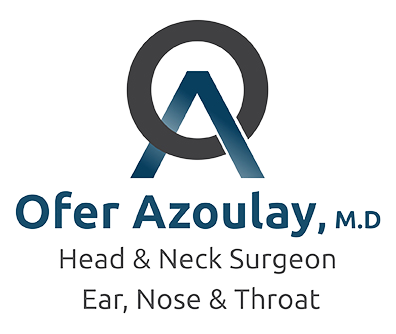Revolutionary Treatment for Obstructive Sleep Apnea:
Hypoglossal Nerve Stimulation (Inspire)
Obstructive Sleep Apnea (OSA) is a prevalent sleep-related ailment characterized by the intermittent relaxation of throat muscles, leading to the obstruction of the airway during sleep. One telltale sign of OSA is persistent snoring. Left untreated, this condition can precipitate serious health complications, including cardiac disease, cognitive decline, depression, and hypertension, among others.
The primary treatment for OSA is typically a CPAP (Continuous Positive Airway Pressure) machine, complete with a mask and hose. While CPAP is a highly effective therapy, some patients find it challenging to use consistently, often leading to discontinued treatment despite their best efforts. The consequences of untreated Obstructive Sleep Apnea can be severe and far-reaching.
Dr. Azoulay and his dedicated team are committed to providing a superior alternative for select patients: Hypoglossal Nerve Stimulation (Inspire) Therapy.
What is Inspire Sleep Therapy?
FDA-Approved: Inspire is an FDA-approved therapy designed to enhance muscle tone in specific tongue and throat tissues, ensuring the airway remains unobstructed during sleep.
Efficacy: According to the 2019 Adhere Registry, Inspire significantly reduced sleep apnea events by an impressive 79%, normalized daily functioning, and decreased snoring by a remarkable 90%.
Patient Criteria: This therapy is indicated for individuals dealing with moderate to severe Obstructive Sleep Apnea, possessing a low BMI (< 40), and facing challenges in using CPAP.
Advantages of Inspire Sleep Therapy
Minimally Invasive: Typically performed as a safe, 90-minute outpatient procedure.
Preserves Anatomy: Inspire works in harmony with your existing anatomy and does not alter, remove, or change it in any way.
Quick Recovery: Patients often return to their normal daily activities within 24 to 48 hours.
Personalized Control: Patients enjoy complete control over the device’s on/off switch a
Insurance Coverage: Inspire is typically covered by most insurance plans, with patient responsibility limited to out-of-pocket deductible costs.
Dr. Azoulay stands as the premier practitioner offering this groundbreaking OSA treatment in Brooklyn. To explore the potential of Inspire Sleep Therapy and to schedule a consultation, we invite you to reach out. Your path to a peaceful and restorative night’s sleep begins here.
Proceadures
Contact Us
More about Dr Azoulay procedures
Dr. Azoulay offers a personal and holistic care for his patients that is characterized by service, quality and safety

Frequently Asked Questions
Different types of head and neck cancers include:
- Oral cavity: mouth, tongue
- Oropharyngeal: throat, back of the mouth
- Nasal Cavity: nose
- Paranasal sinus: sinuses, openings near the nose
- Nasopharyngeal: behind the nose, upper throat area
- Laryngeal: voice box
- Hypopharyngeal: voice box, lower part of the throat
- Salivary glands (Parotid, submandibular, minor salivary glands)
- Thyroid
- Skin cancer
- Lymphoma
There’s no such thing as a “standard” set of symptoms. Depending on the location and type of cancer some people experience very few warning signs until their cancer has started to spread, while others notice something out of the ordinary right away.
Many symptoms of head and neck cancer can also be caused by other, less serious conditions, such as sinus or throat infections. Even though there’s a good chance that something other than cancer is causing your symptoms, you should still bring them to the attention of a medical professional and discuss the next steps.
Symptoms of laryngeal and hypopharyngeal cancer
Laryngeal cancer develops in the voice box, while hypopharyngeal cancer develops in the lower part of the throat. The most common symptoms of both cancers include hoarseness, constant coughing, difficulty swallowing and a sore throat that does not go away.
Symptoms of oral cancer
Oral cancer can develop anywhere in the mouth, including the lips, cheeks, gums, tongue and palate (roof). The most common symptoms are sores and swollen spots inside the mouth, red or white patches on the lips, difficulty moving the jaw or tongue, loss of otherwise healthy teeth and a feeling that something is stuck in the throat.
Symptoms of nasal cavity and paranasal sinus cancer
Nasal cavity cancer develops in the small passageway just behind the nose. Paranasal sinus cancer develops in the small, air-filled bubbles around the nasal cavity. These cancers typically cause facial pain, nosebleeds, post-nasal drip, watery eyes, changes in vision and nasal congestion that doesn’t go away.
Neck Lump
Neck lump could be simple, swollen, and reactive lymph node. However, a persistent neck mass, that does not disappear within few weeks, even without symptoms, should be evaluated to rule out cancer.
They are as varied as the cancers themselves. Much depends on location, overall health, and cancer staging, or how developed the lesion is and if it’s spread to other areas of the body. Surgical excision is a common treatment as is laser therapy, radiation, chemotherapy, and targeted therapy. Dr. Azoulay fully coordinates care plans from initial diagnosis to treatment to follow-up care.
To schedule an appointment, please call the office at (718) 270 1498.
We participate with most health insurance plans. Please call our office staff at (718) 270 14978 for specific questions.
If your insurance plan requires you to obtain a referral prior to a specialty visit, then contact your primary care doctor first. If your plan allows a specialty visit without a referral, then please call us at (718)270 1498 to arrange your visit.
When you schedule your appointment, the staff will ask you to have your records faxed to our office as soon as possible. This is requested so that we can accordingly schedule those patients in need of an urgent visit. On the day of your visit, you may need to bring original or copies of your radiology studies – for example, CAT scans, MRI, sonograms, or PET scans.
To obtain your written reports and records, you (as the patient) must request that they be sent to our office directly. For originals or copies of radiology films, you’ll need to request them from the radiology office that performed the study(s). There may be a fee associated with this, depending on the radiologist’s policies. If you have had your studies arranged by our office, you do not need to get your films, since we can access them.
Dr. Azoulay operates at New York Presbyterian Methodist Hospital, Maimonides Medical Center, and SUNY Downstate Medical Center. Depending on your condition and preference a surgery will be scheduled to one of the hospitals located in Brooklyn.
CONTACT
1) 185 Montague St 5th FL , Brooklyn, NY 11201
2) 376 6th Avenue , Brooklyn , NY , 11215
718-780-1498
